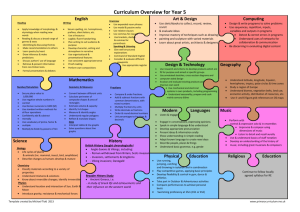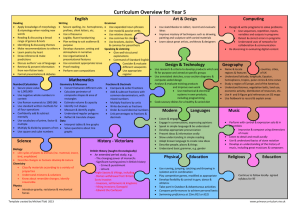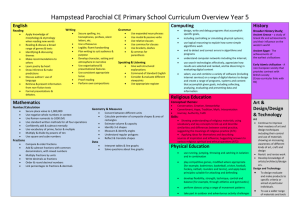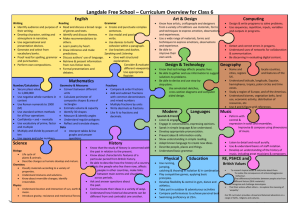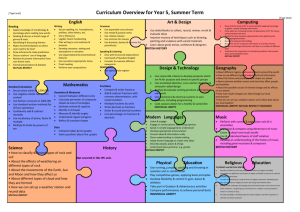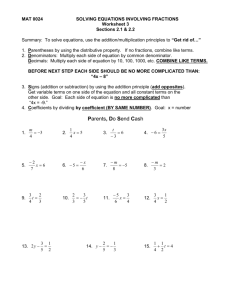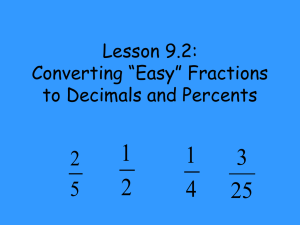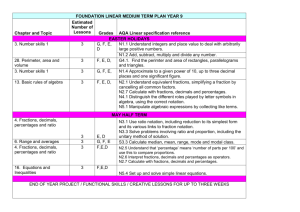primes computing
advertisement
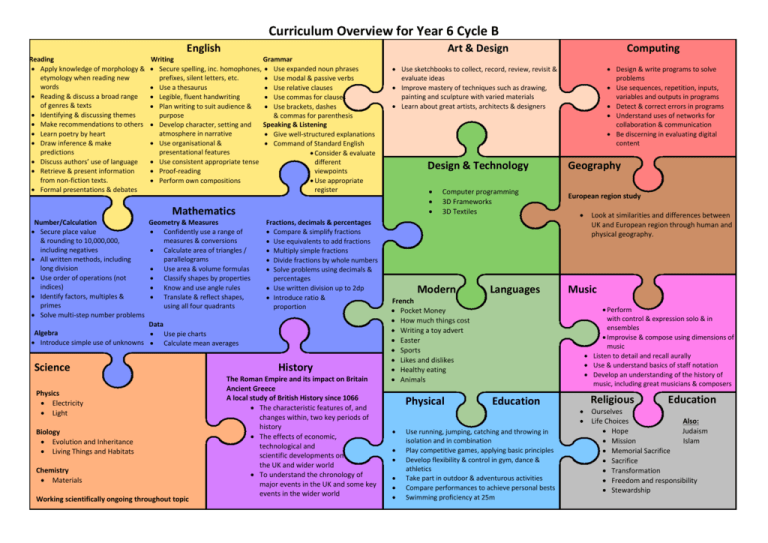
Curriculum Overview for Year 6 Cycle B English Reading Apply knowledge of morphology & etymology when reading new words Reading & discuss a broad range of genres & texts Identifying & discussing themes Make recommendations to others Learn poetry by heart Draw inference & make predictions Discuss authors’ use of language Retrieve & present information from non-fiction texts. Formal presentations & debates Art & Design Writing Grammar Secure spelling, inc. homophones, Use expanded noun phrases prefixes, silent letters, etc. Use modal & passive verbs Use a thesaurus Use relative clauses Legible, fluent handwriting Use commas for clauses Plan writing to suit audience & Use brackets, dashes purpose & commas for parenthesis Speaking & Listening Develop character, setting and atmosphere in narrative Give well-structured explanations Use organisational & Command of Standard English presentational features Consider & evaluate Use consistent appropriate tense different Proof-reading viewpoints Perform own compositions Use appropriate register Use sketchbooks to collect, record, review, revisit & evaluate ideas Improve mastery of techniques such as drawing, painting and sculpture with varied materials Learn about great artists, architects & designers Design & Technology Mathematics Number/Calculation Secure place value & rounding to 10,000,000, including negatives All written methods, including long division Use order of operations (not indices) Identify factors, multiples & primes Solve multi-step number problems Geometry & Measures Confidently use a range of measures & conversions Calculate area of triangles / parallelograms Use area & volume formulas Classify shapes by properties Know and use angle rules Translate & reflect shapes, using all four quadrants Fractions, decimals & percentages Compare & simplify fractions Use equivalents to add fractions Multiply simple fractions Divide fractions by whole numbers Solve problems using decimals & percentages Use written division up to 2dp Introduce ratio & proportion Data Algebra Use pie charts Introduce simple use of unknowns Calculate mean averages Science Physics Electricity Light Biology Evolution and Inheritance Living Things and Habitats Chemistry Materials Working scientifically ongoing throughout topic History The Roman Empire and its impact on Britain Ancient Greece A local study of British History since 1066 The characteristic features of, and changes within, two key periods of history The effects of economic, technological and scientific developments on the UK and wider world To understand the chronology of major events in the UK and some key events in the wider world Computing Computer programming 3D Frameworks 3D Textiles Modern Languages Design & write programs to solve problems Use sequences, repetition, inputs, variables and outputs in programs Detect & correct errors in programs Understand uses of networks for collaboration & communication Be discerning in evaluating digital content Geography European region study Music French Pocket Money How much things cost Writing a toy advert Easter Sports Likes and dislikes Healthy eating Animals Physical Look at similarities and differences between UK and European region through human and physical geography. Perform with control & expression solo & in ensembles Improvise & compose using dimensions of music Listen to detail and recall aurally Use & understand basics of staff notation Develop an understanding of the history of music, including great musicians & composers Education Use running, jumping, catching and throwing in isolation and in combination Play competitive games, applying basic principles Develop flexibility & control in gym, dance & athletics Take part in outdoor & adventurous activities Compare performances to achieve personal bests Swimming proficiency at 25m Religious Education Ourselves Life Choices Also: Hope Judaism Mission Islam Memorial Sacrifice Sacrifice Transformation Freedom and responsibility Stewardship Curriculum Overview for Year 5 Cycle B English Reading Apply knowledge of morphology & etymology when reading new words Reading & discuss a broad range of genres & texts Identifying & discussing themes Make recommendations to others Learn poetry by heart Draw inference & make predictions Discuss authors’ use of language Retrieve & present information from non-fiction texts. Formal presentations & debates Number/Calculation Secure place value to 1,000,000 Use negative whole numbers in context Use Roman numerals to 1000 (M) Use standard written methods for all four operations Confidently add & subtract mentally Use vocabulary of prime, factor & multiple Multiply & divide by powers of ten Use square and cube numbers Art & Design Writing Grammar Secure spelling, inc. homophones, Use expanded noun phrases Use sketchbooks to collect, record, review, revisit & prefixes, silent letters, etc. evaluate ideas Use modal & passive verbs Use a thesaurus Use relative clauses Improve mastery of techniques such as drawing, painting and sculpture with varied materials Legible, fluent handwriting Use commas for clauses Plan writing to suit audience & Learn about great artists, architects & designers Use brackets, dashes purpose & commas for parenthesis Speaking & Listening Develop character, setting and atmosphere in narrative Give well-structured explanations Use organisational & Command of Standard English presentational features Consider & evaluate Use consistent appropriate tense different Design & Technology Proof-reading viewpoints Perform own compositions Use appropriate register Computer programming 3D Frameworks 3D Textiles Mathematics Geometry & Measures Convert between different units Calculate perimeter of composite shapes & area of rectangles Estimate volume & capacity Identify 3-d shapes Measure & identify angles Understand regular polygons Reflect & translate shapes Data Interpret tables & line graphs Solve questions about line graphs Science Physics Electricity Light Biology Evolution and Inheritance Living Things and Habitats Chemistry Materials Working scientifically ongoing throughout topics Fractions Compare & order fractions Add & subtract fractions with common denominators, with mixed numbers Multiply fractions by units Write decimals as fractions Order & round decimal numbers Link percentages to fractions & decimals History The Roman Empire and its impact on Britain Ancient Greece A local study of British History since 1066 The characteristic features of, and changes within, two key periods of history The effects of economic, technological and scientific developments on the UK and wider world To understand the chronology of major events in the UK and some key events in the wider world Modern Languages Computing Design & write programs to solve problems Use sequences, repetition, inputs, variables and outputs in programs Detect & correct errors in programs Understand uses of networks for collaboration & communication Be discerning in evaluating digital content Geography European region study Music French Pocket Money How much things cost Writing a toy advert Easter Sports Likes and dislikes Healthy eating Animals Physical Look at similarities and differences between UK and European region through human and physical geography. Perform with control & expression solo & in ensembles Improvise & compose using dimensions of music Listen to detail and recall aurally Use & understand basics of staff notation Develop an understanding of the history of music, including great musicians & composers Education Use running, jumping, catching and throwing in isolation and in combination Play competitive games, applying basic principles Develop flexibility & control in gym, dance & athletics Take part in outdoor & adventurous activities Compare performances to achieve personal bests Swimming proficiency at 25m Religious Education Ourselves Life Choices Also: Hope Judaism Mission Islam Memorial Sacrifice Sacrifice Transformation Freedom and responsibility Stewardship
